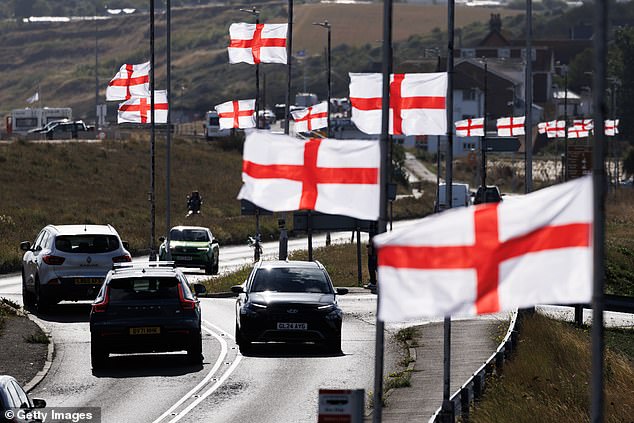The sight of flags flying in Britain has sparked a heated debate — and, surprisingly, it’s not just the British weighing in.
Across the Atlantic, many Americans, who are famously devoted to their Stars and Stripes, have been joining the conversation.
A YouGov poll suggests that nearly half of Americans own a flag, and about a quarter proudly display it every day.
For them, flag-flying isn’t just decoration — seven in ten say it’s a clear act of patriotism.
How Operation Flying the Colours Began
The recent wave of Union Jacks and St George’s Cross flags in England didn’t appear out of nowhere.
It followed protests at asylum hotels and the appearance of Palestinian flags in Birmingham, sparking a counter-movement some are calling Operation Flying the Colours.
For its supporters, the campaign is about national pride.
For critics, it risks being hijacked by elements of the far-right.
Supporters have hung flags across town centres, marked road signs, and even painted symbols on roundabouts.
Yet, not everyone is on board.
Councils in places like Tower Hamlets and Birmingham have taken flags down from lampposts, citing health and safety concerns.
Americans Rushing to Britain’s Defence
Interestingly, conservative voices in the United States have become unlikely cheerleaders for this British flag movement.
TikTok users, activists, and even politicians have rallied online, praising Brits for “standing up” with their flags.
It seems that, despite fighting a war to leave Britain centuries ago, some Americans now say they’re fond of the Union Jack after all.
The Story of a Proud Immigrant Husband
One prominent supporter is Riley Gaines, a conservative activist linked with Turning Point USA.
She recently shared a photo with her British husband, Louis Barker, proudly standing by the American flag outside their home.
According to her, planting a massive 25-foot flagpole was the first thing he did upon arriving in the U.S.
She described him as “more patriotic than most Americans,” despite still facing immigration hurdles because of his refusal to get vaccinated against Covid-19.
Calls for Flags to Be Made Compulsory
Others have gone even further.
Lee Cohen, a former advisor on U.S.–UK relations, wrote in GB News that displaying the Union Jack and St George’s Cross should be compulsory in public spaces.
In his words, these flags “are anything but controversial” and should stand as the sole symbols of England, free from “pandering to foreign causes.”
Politicians and Influencers Join the Chorus
Virginia state delegate Nick Freitas told his 1.5 million Instagram followers that he sees British flag-flying as “great news.”
He mocked local councils for rushing to remove the displays and compared it to American patriotism — while also pointing at his own t-shirt decorated with handguns.
Meanwhile, a TikTok personality resembling Joe Rogan called on his 500,000 followers to “pray for the UK” as it seeks its “own liberation.”
His fiery speech celebrated Brits for “raising their flags up high” and supposedly rejecting “Sharia law.”
Even U.S. Vice President JD Vance chimed in, telling Fox News that people should be proud of their heritage and dismiss what he called “craziness” — the idea that flying a flag is somehow offensive.
The British Political Response
Back in the UK, the debate has divided political leaders.
Conservatives have openly supported the campaign, with Robert Jenrick physically putting up flags and Kemi Badenoch writing that the banners represent “unity, nationhood, and optimism.”
She stressed that patriotism is not extreme and “there is nothing racist about flying the flag of your nation.”
However, critics argue that the far-right has latched onto the movement.
Figures like Tommy Robinson and groups such as Britain First have voiced support, with the campaign even accepting donated flags from them — though Britain First denies being a fascist organisation.
Labour’s Position on the Flags
Even Labour leader Sir Keir Starmer’s office has been careful not to dismiss the movement.
His spokesperson reaffirmed that the Prime Minister “absolutely” supports the display of English flags, pointing to his consistent pride in Britain, from political speeches to moments of sporting glory such as the Lionesses’ success in the Euros.
So, What’s Next for the Movement?
As it stands, Operation Flying the Colours is both celebrated and condemned, gaining traction in both the UK and the US.
What began as a local movement has turned into an international talking point, fuelled by social media, politicians, and culture warriors alike.
The question now is whether flag-flying in Britain will remain a unifying act of patriotism — or if it risks being overshadowed by extremist voices claiming it as their own.
